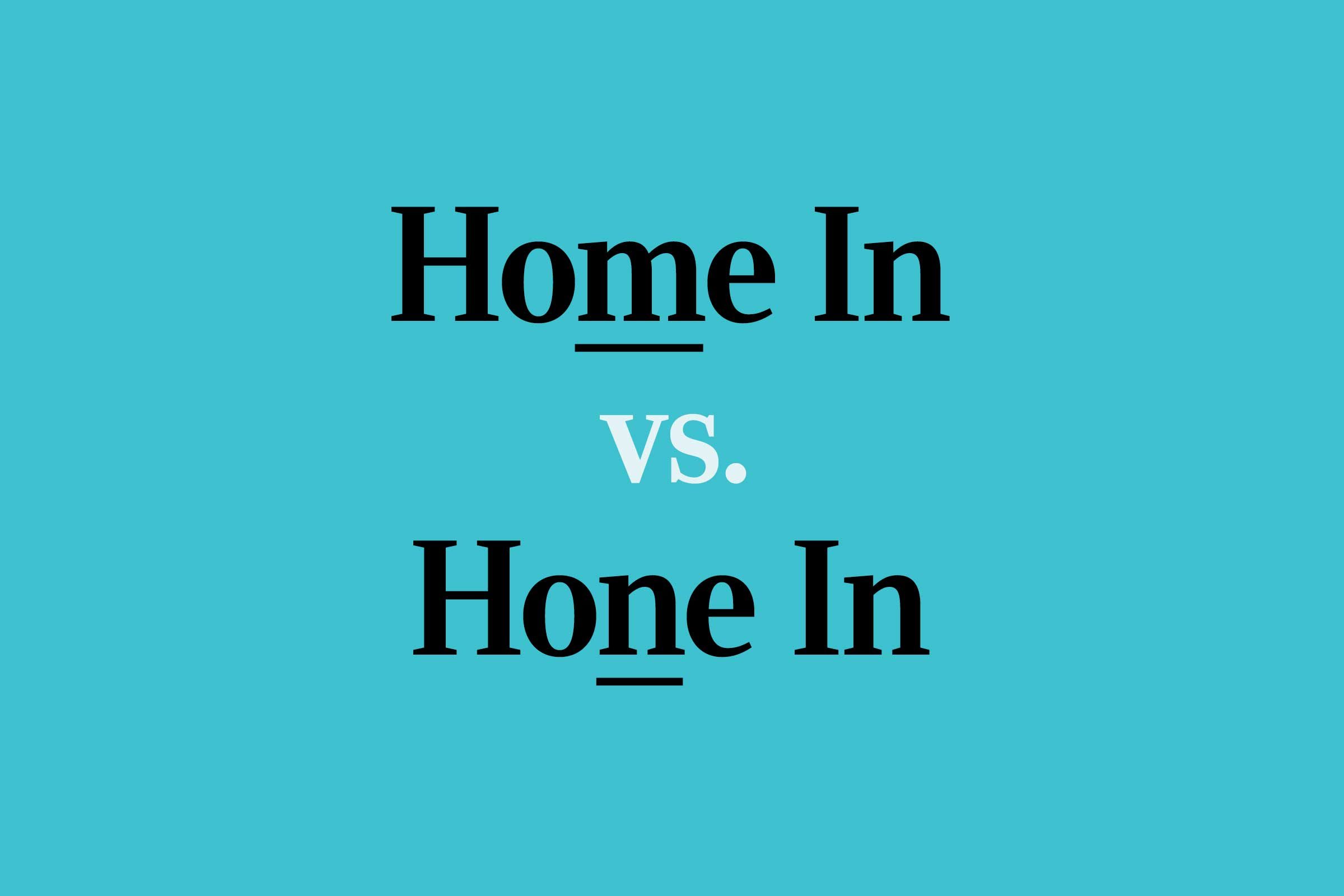Puzzling over the commonly confused "home in" vs. "hone in"? With our grammar guidance, you can home in on the correct usage.

“Home In” vs. “Hone In”: What’s the Difference?

If your boss asks you to hone in on the best spot for a new retail outlet, what will you say? Will your perverse inner grammarian start a debate about “home” in vs. “hone in”? Or will you wisely get on with the task, just like when she emailed you to order “stationary” vs. “stationery”?
Of course, calling out your superior at work is never a good strategy, but learning the right grammar rules and proper use of idioms could help prompt that promotion. English offers endless examples of words that are mistakenly used for one another, with many commonly mixed to our own detriment. Sometimes, it’s a misunderstanding of the definition. The unobtrusive “discreet” vs. “discrete” comes to mind. But when it comes to “home in” vs. “hone in,” do you know which one is correct?
If not, we’re letting you know below. We’re sharing exactly what “home in” and “hone in” mean, plus examples of how to use both phrases in a sentence. And if you feel you might forget, don’t worry. We have tips and tricks for remembering, along with insight on how the two got confused in the first place.
So read on to end the “home in” vs. “hone in” debate for good.
Get Reader’s Digest’s Read Up newsletter for more knowledge, fun facts, humor, cleaning, travel and tech all week long.
Which is correct: “home in” vs. “hone in”?
“Home in” has longevity and grammar gatekeepers on its side. For most traditional linguists, “home in” is correct, and hone in is not accepted as a substitute. If you’re invested in avoiding words you’re using wrong, or in this case, a phrase, use “home in” or even zero in before using “hone in.”
What is the definition of “home in”?
The original definition of “home” as an abode helps explain its later use as a verb. Prior to the mid-18th century, “home” existed only as a noun, but increasing mentions of homing pigeons, birds that return to the roost, offered a lasting metaphor. The original “home” or “homing” grew with time, and the phrase expanded to include “home in.” The first reference to “home in on” can be traced to an early-20th-century pigeon race in Australia. In more contemporary times, “to home in” means putting all your attention toward something (figuratively, homing in on a solution) or heading toward a target.
Examples of “home in” in a sentence
- Finding an apartment can be difficult unless you home in on the right neighborhood.
- I asked the executive team to home in on the three most salient points for the company mission statement.
- Watching a dog as he homed in on hidden treats entertains even the most die-hard curmudgeon.
What is the meaning of “hone in”?
Despite the controversy of “home in” vs. “hone in,” “hone” itself is a real word. Go back a few hundred years, and “hone” means to smooth and sharpen a blade with a whetstone. Fast-forward to the 20th century, and “hone” gains a more metaphorical meaning: to sharpen skills or to refine or perfect something. In the ’60s, “hone in” as a phrase starts its vernacular leap as a substitute for home in. Among its early adopters: George H.W. Bush, who used “honing in on the issues” while running for president. Of course, it’s not a grammar rule that has changed, and traditionalists found his grammar lacking. “Home in” would have been correct.
Examples of “hone” in a sentence
- My son’s company sends its executives to a training program to hone their management skills.
- The best man delivered a finely honed speech at his cousin’s wedding.
- The novelist spent hours trying to hone the plot of his latest crime thriller.
Why are “home in” and “hone in” often mistaken or misused?
There are a few reasons why people mix up “home in” and “hone in.” For starters, they sound almost identical—especially when spoken casually. It’s easy to blur the line between the two. On top of that, “hone in” has become so common in everyday use that many dictionaries now recognize it as an acceptable alternative—even though it originally started as a mistake. Merriam-Webster calls it something of a creeping Americanism and an “alteration of home in.” The Chicago Manual of Style agrees, saying “this phrase is frequently misrendered hone in.” So when in doubt, “home in” prevails.
Can “hone in” be used in formal writing?
When it comes to formal writing, “hone in” is generally seen as incorrect. The phrase “home in” is the traditional and preferred choice.
What are tricks for remembering “home in” vs. “hone in”?
For sure, “home in” vs. “hone in” falls into the confusing grammar rules category. Few people will even call you out for using “hone in” when “home in” is correct. And while it’s not among the more common grammar mistakes, the sticklers among us who prefer to avoid the vernacular error recall those homing pigeons with their singular mission. After all, a chef may hone incredible cooking skills while he homes in on where to build a destination restaurant.
“Home in” vs. “hone in”: Test your knowledge!
Why trust us
At Reader’s Digest, we’re committed to producing high-quality content by writers with expertise and experience in their field in consultation with relevant, qualified experts. We rely on reputable primary sources, including government and professional organizations and academic institutions as well as our writers’ personal experiences where appropriate. We verify all facts and data, back them with credible sourcing and revisit them over time to ensure they remain accurate and up to date. Read more about our team, our contributors and our editorial policies.
Sources:
- Merriam-Webster: “Hone in”
- Merriam-Webster: “Hone”























